- Home
- Joan Lowery Nixon
The Haunting Page 2
The Haunting Read online
Page 2
I stopped listening to the minister and designed an imaginary banner. Across a bright blue background were gold letters in an elegant script: WOMEN WHO ARE EXCEPTIONALLY BRAVE. I hung it across the back of the chapel, mentally pinning it to the dark red velvet drapes that covered the wall.
Sarah had been brave, and so had her mother, Elizabeth Clary. Elizabeth didn’t try to escape San Francisco during the great earthquake of 1906, but helped dig people out of collapsed buildings and save them from the fires that followed.
I suppose everyone took it for granted that Elizabeth had been an exceptionally brave woman. Elizabeth, born in 1877, was Charlotte Blevins’s daughter.
Grandmother Augusta was no slouch, either. An army nurse and officer, Augusta helped to arrange rescue operations to get children out of Vietnam. And in the sixties she marched through the South with civil rights groups.
Mom marched with her, when she was a teenager like me. And when Mom got her Ph.D. in psychology, she married Dad because the two of them not only fell in love, but they also had the same dream—to help homeless children. Dad got a job with a child protective agency, and Mom with a private group that counsels abused women and children. They regularly lobbied state and national officials, trying to get funds and better legislation, and Mom had a reputation for not being afraid to tackle anybody—including the President of the United States.
Sighing, I began to embroider names on my imaginary banner, WOMEN WHO ARE EXCEPTIONALLY BRAVE: Charlotte Blevins Porter, Elizabeth Porter Clary, Sarah Clary Langley, Augusta Langley Moore, and Anne Moore Starling. I ran out of space on the banner, but that was all right. There was no way my name could belong on it.
Mom nudged me, and I realized that the minister had stopped speaking and people were leaving the chapel. Augusta began briskly shaking hands with people and thanking them for coming. Mom, too.
I hung back, as I usually did. None of these people wanted to talk to me.
It was surprising how fast the room cleared. I guess everyone was in a hurry. Maybe that was the way things were in San Francisco.
It wasn’t like that in Louisiana. As soon as word got out that Grandpa had died, people began coming by Grandma’s house with pies and cakes. I’d stayed out of the kitchen because people I’d never seen before were busy sliding casseroles into the oven, and slicing hams, and setting out Grandma’s good china plates. After the funeral the house was crowded with people. They cried a little and laughed a lot, telling and retelling stories about Grandpa. Some of the stories got kind of boring, but at least Grandma didn’t have to feel alone.
Thinking about Grandpa made me miss him. I was only ten when he died, but I remembered him as being a kind, gentle, quiet man who read stories to me any time I asked.
“Come on, Lia. It’s time to go,” Mom said.
When I saw that Grandma was carrying the urn with Sarah’s ashes in it I took a step back. “Doesn’t that urn go to—uh—a cemetery or something?” I asked.
“No,” Grandma said. “I’m going to take it home and keep it in the library.”
I shuddered. I couldn’t help it.
Mom gave one of her impatient sighs and said, “We’ve got a tight schedule. We have an appointment with Sarah’s attorney in an hour. I’d suggest that we have lunch before we meet Mr. Clayton.”
“Somewhere with quick service,” Grandma added.
I thought of taking the urn into a fast-food hamburger place and started to giggle. The giggle hopped out of control and spread into a belly laugh. I laughed so hard I bent over, holding my stomach. But at the same time I thought of this great-grandmother I didn’t really know and how everybody praised her but nobody seemed to be mourning her, and tears for Sarah ran down my face.
Mom wrapped her arms around me and held me tightly. “Darling,” she murmured, “I didn’t realize what stress all of this has been. I shouldn’t have brought you with me.”
My sobs and laughter stuck in my throat, turning into hiccups. “It’s okay, Mom,” I managed to say. “Could I get a drink of water?”
A pale-faced man in a dark suit suddenly appeared at my side and held out a glass of water. Gratefully I took it and gulped it down.
Grandma fixed her gaze on the man and asked, “Is there somewhere nearby where we can get food quickly?”
He nodded. “There’s a hamburger place on the corner.”
I didn’t mean to, but once again I exploded into laughter.
“It happens,” the man said. “Nervous tension.” He shoved an open bottle of smelling salts under my nose, and the horrible smell made me choke and cough. At least it stopped the laughter.
Mom pulled out a tissue and mopped at my eyes.
Grandma said, “I swear she isn’t like the Moore side of the family—or anyone else as far back as we know.”
Mom patted me reassuringly, and we left the funeral home. As we climbed into our rental car Mom glanced at Sarah’s urn. Her eyebrows rose, as they sometimes did when she’d just had a surprising thought, and a tiny smile flickered at the corners of her lips. She said, “Why don’t we order at the drive-in window? I saw a small park in the next block. We can eat our hamburgers there.”
That was the difference between Mom and me. Mom and I saw the same problem. I had an embarrassing case of hysterics, but Mom worked out a solution to the problem. I slumped down in the backseat, wishing I’d gotten even a few of the genes from the Women Who Are Exceptionally Brave. Why did I get left out?
We made it to the office of Gerald R. Clayton, attorney-at-law, exactly on time. It didn’t surprise me. Mom and Grandma were always prompt.
Mr. Clayton was a tall, very thin man, who was wearing a charcoal gray pin-striped suit that made him look even thinner. He came to the waiting room to greet us and led us down a hallway to a small conference room. “That was a lovely memorial service for Sarah,” he murmured.
When we were all seated and the receptionist had placed glasses of ice water for each of us on the table, Mr. Clayton said, “Sarah was a remarkable woman. Did she tell you that she gave me flying lessons?”
He went on to tell us about the flying club Sarah had founded. It was an exclusive club with high dues, but the dues went to provide summer camp for children who wouldn’t have been able to go.
I wished I had gotten to know my great-grandmother. I wished she’d had time to know me. I felt certain that I would have liked her even if her accomplishments seemed overwhelming.
Grandma impatiently shifted in her chair. She cleared her throat, and Mr. Clayton changed the subject. “How long will you be in San Francisco?” he asked.
“Only as long as it takes to dispose of Mother’s things,” Grandma answered. “Then I’ll return to my home in Baton Rouge.”
Mr. Clayton nodded, then looked at the papers in front of him. “Are you ready for me to read the will now?”
“If that’s what should be done. Yes,” Grandma said.
“It’s not a complicated will,” Mr. Clayton began. “If you’d like, I can skip all the legal statements in the beginning and summarize it for you. I’ll give you a copy to read later.”
“Thank you, that will be fine,” Grandma agreed. She settled back in her chair to listen.
“Sarah Langley made some provisions for special gifts to a few select friends as well as her longtime caregiver. She has left a donation to the summer camp program, her favorite charity. And now for the family. She has left you, Mrs. Moore, as her only child, her house, most of the furnishings and property within it, and her stocks and bonds.”
Grandma nodded. She threw a quick glance at me, as though challenging what I’d told her, and said, “And Graymoss, of course.”
“Indeed, she has left property called Graymoss, which consists of a house, all its contents, the outbuildings, and land, to her granddaughter, Anne Starling.”
Grandma sat upright, clenching her hands. She stared into Mr. Clayton’s eyes. “Are you sure my mother knew what she was doing when she made that provision
to her will?”
Mr. Clayton didn’t look surprised. I wondered if Sarah had warned him how Grandma would react. He stared right back and said, “This will was dated ten years ago. If you are concerned about whether or not Sarah was of sound mind, I can assure you that she was.”
Grandma thought for just a few seconds, then gave in. “It doesn’t matter who inherits Graymoss,” she said with a voice of authority, “as long as the house is destroyed.”
Mr. Clayton picked up the will, turned a page, and continued, “Graymoss comes with a few strings. It was Charlotte Blevins Porter’s wish that the house be kept standing and well cared for, and it was important to the dear departed that this wish be carried out to the letter of the law.”
“A wish is nothing more than a foolish notion,” Grandma retorted. “It wouldn’t be binding by law.”
“Graymoss has been left to Mrs. Anne Starling conditionally,” the lawyer reiterated. “That means she must—”
“We know what conditionally means,” Grandma snapped. “Just what are these conditions?”
“That Graymoss must continue to be cared for,” Mr. Clayton answered. “If Mrs. Starling can’t agree to this, then possession of the house and property passes to Mrs. Starling’s daughter, Lia Starling, to be held in trust for her until her twenty-fifth birthday.”
I started in surprise. “To me? Graymoss?” I could see myself in my daydream again, rocking and reading on the quiet veranda. “Wow!” I whispered to myself.
“That’s ridiculous! The house must be destroyed!” Grandma insisted.
“Wait a minute,” Mom interrupted. I could tell she’d been thinking hard, because her eyes were wide. “Graymoss is a large place. About how many rooms, would you guess?”
“What has the number of rooms got to do with anything?” Grandma asked.
“It has to do with making a dream come true! If the house is in good condition, or can be repaired without too much expense, I know what we must do.”
I sucked in my breath. I knew Mom’s dream, and I didn’t like it one little bit.
Grandma said, “If you’re talking about that notion you and Derek have of adopting a houseful of what are considered unadoptable children—”
“That’s exactly what I’m talking about!” Mom exclaimed, grinning and clapping her hands like a little kid. I was embarrassed, but she didn’t seem to care.
“But you can’t, Anne! I told you, Graymoss is evil!”
Mr. Clayton raised an eyebrow and looked at Grandma as if she’d just claimed there were UFOs on the roof. “Evil? You have firsthand knowledge of some kind of evil?”
Grandma turned red. She looked down at her hands and said, “This is very complicated—it’s family business.”
“I don’t believe in ghosts,” Mom said firmly. “But I do believe in trying to bring happiness to as many children as possible.”
I groaned. I could see what was going to happen. The quiet rooms, the peaceful veranda—forget it. Graymoss was going to be filled with a crowd of noisy kids for Mom and Dad to care for.
“I can’t wait to call Derek and tell him the news,” Mom said.
Mr. Clayton broke in. “Don’t rush into anything,” he said. “There’s one more condition to meet. Before you agree to accept Graymoss you must read Charlotte Blevins’s diary.”
Grandma looked smug. “The diary. That’s right. Read it, and you’ll soon change your mind about wanting to live in that house. All the others did.”
“The others?”
“Elizabeth, Sarah, and even Charlotte herself. Why do you think none of the women in our family ever resided in Graymoss?”
“Because they were scared?” I asked. The mental banner I’d created for the Women Who Are Exceptionally Brave began to fray. I didn’t mind.
Grandma frowned at me. “Not scared, merely sensible.”
Mom looked at Mr. Clayton. “Have you read Charlotte’s diary?”
“No, I haven’t,” he answered. “I am in possession of it now, but the contents of the diary are private.”
“It’s private because it tells of the terrible evil within the house,” Grandma said.
Mr. Clayton held out a book covered in padded cloth. Once it must have had a flower pattern in bright colors, but now it was faded, and there were ragged threads at the edges.
Mom didn’t move, but suddenly I found myself standing up. I reached across the desk and took the diary from Mr. Clayton.
Maybe it was because I wasn’t like the other women in the family. Or maybe it was because I read. Or maybe it was because I did believe in ghosts. I sat back down in my chair, the book in my hands, and I shivered with excitement.
I planned to read the diary before Mom ever got a chance to, so that she couldn’t tell me not to read it. If there really was evil in Graymoss, I wanted to find out where it had come from. In fact, I hoped to become acquainted with the ghosts that haunted the plantation. Someday, when I was grown, the quiet, peaceful Graymoss—ghosts and all—would be mine.
CHAPTER THREE
I had plenty of time to read Charlotte’s diary. Mom kept arguing with Grandma about the future of Graymoss, and talking on the phone to Dad. No one was the least bit concerned about where I was or what I was doing, so I found a hideaway in Great-grandmother’s house—an upstairs sewing room that probably hadn’t been used for anything but storage for years and years. I pulled an old quilt off a Boston rocker, settled down, and began to read.
The first part of Charlotte’s diary detailed the horrors of the War Between the States, and then Charlotte poured out her heart about how much she missed her parents and grandmother. She wrote a great deal about her grandfather, Placide Blevins, who must have been kind and good to her, because she loved him very much. He liked to read aloud from his most cherished book: Favorite Tales of Edgar Allan Poe. He read it so often to Charlotte that the two of them had practically memorized the stories.
Charlotte wrote in her diary:
I have often wondered, What kind of a man was Edgar Allan Poe who could create such strange, frightening tales?
Grandfather told me that Poe’s poetry and stories came from a tortured soul and someday I’d understand.
Perhaps I will. But for now I’m content to read Poe’s stories simply for the pleasurable excitement they stir within my heart and mind.
“Oh, Charlotte! You loved to read, too!” I said aloud. I felt close to this relative who shared her own love of books with me by providing me with her own diary to read.
As I read, it became obvious to me how very much the Graymoss plantation meant to Charlotte. She had been born in Graymoss. She loved the beauty of her home and described the ornate ceilings with special moldings that were full of designs with swirls and flowers, yet looked like eyes and mouths and even noses of strange people and animals if the light was dim.
I love to use my imagination, too, I thought, delighted that I’d discovered an ancestor so much like myself.
Charlotte wrote about her best friend, Lenci Cavanaugh, but there was very little about games or boys, because the miseries of the War Between the States dominated their lives. The Blevinses and Cavanaughs had field hands who had run away, heading north to freedom, so everyone had to pitch in and help since crops still had to be planted and harvested, although most of the vegetables and fruit they’d grown had been taken by army troops to feed the soldiers.
Charlotte’s grandfather was desperate for help and hired a foreman, Morgan Slade. Charlotte renamed Mr. Slade the Cat.
He sneaks in and out of the house as quietly as a cat slips through an open window. His eyes dart from one side to the other with a glitter to them, yet he never misses a thing. I suspect him of snooping around our house. I wouldn’t put it past him. When Grandfather isn’t nearby Mr. Slade is mean to the workers. I’ve heard him yell and curse them if he finds something not to his liking. Grandfather must have heard about this from someone because he has had words with Mr. Slade. It hasn’t helped. Mr. Slade is
even more surly. I know that Grandfather is desperate for hired help, so he hasn’t fired Mr. Slade. I wish he could because I don’t trust Mr. Slade.
There were breaks in Charlotte’s diary, and the entries grew shorter.
I can’t help worrying how we will manage to survive, although Grandfather keeps assuring me that things will turn out all right eventually. He insists they always do.
I worried along with Charlotte as I read her diary. As the South suffered great losses, Charlotte grew even more fearful about the future. Food became scarcer. I ached for Charlotte as she described her sixteenth birthday:
The day began happily. After we had breakfasted, Grandfather took me to a lovely spot in the side yard that was mottled with sun and shade. He knew I had long wished for an herb garden, so he had made and planted one for me. Thyme, dill, rosemary—all were bordered with a graceful brick edging. Grandfather had helped to build Graymoss, so I knew how much he loved to work with brick and mortar. Sharing his talents with me had been a real labor of love, and I was delighted with his gift.
Later, Grandfather came in with a hen—one that had escaped the last group of foragers by running into the woods. The bird looked old enough to be tough, but Grandfather and I cleaned and plucked it and baked it slowly for two hours in half a bottle of his best white wine. With a bouquet of wildflowers on the table, the candelabra filled with glowing candles, and the chicken on a platter, I could ignore the usual turnips and boiled potatoes that accompanied the chicken and call the dinner a birthday feast.
Mr. Slade suddenly appeared. Greedily eying the chicken, he bluntly said that he wanted to share the meal, but Grandfather respected my wishes and told him we were having a private family dinner.
Mr. Slade eyed the silver candelabra and smiled. “It won’t be long now until the Federals march in,” he said. “Those fancy candlesticks and the rest of your silver will make pretty souvenirs—that is, if they’re still here when the Federals arrive.”

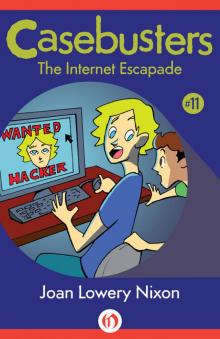 The Internet Escapade
The Internet Escapade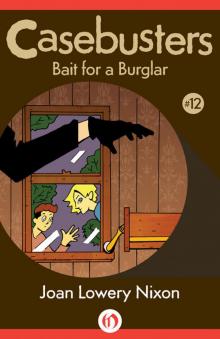 Bait for a Burglar
Bait for a Burglar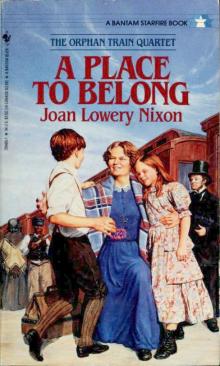 A Place to Belong
A Place to Belong Nightmare
Nightmare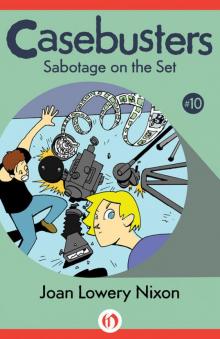 Sabotage on the Set
Sabotage on the Set The Other Side of Dark
The Other Side of Dark Whispers from the Dead
Whispers from the Dead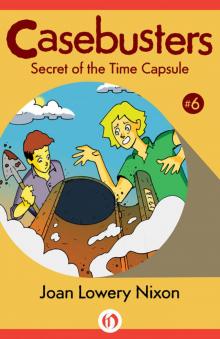 Secret of the Time Capsule
Secret of the Time Capsule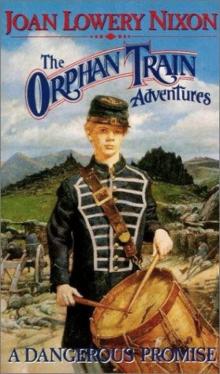 A Dangerous Promise
A Dangerous Promise Laugh Till You Cry
Laugh Till You Cry Spirit Seeker
Spirit Seeker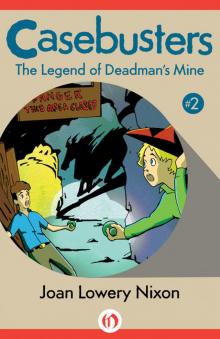 The Legend of Deadman's Mine
The Legend of Deadman's Mine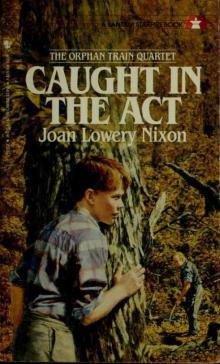 Caught in the Act
Caught in the Act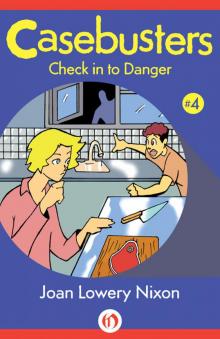 Check in to Danger
Check in to Danger Ellis Island: Three Novels
Ellis Island: Three Novels The Name of the Game Was Murder
The Name of the Game Was Murder The Haunting
The Haunting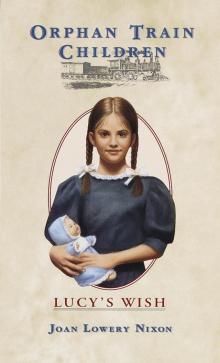 Lucy’s Wish
Lucy’s Wish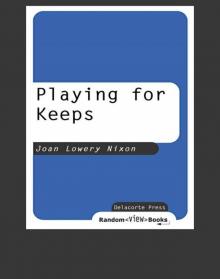 Playing for Keeps
Playing for Keeps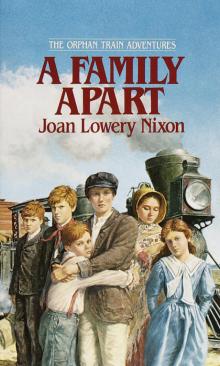 A Family Apart
A Family Apart Nobody's There
Nobody's There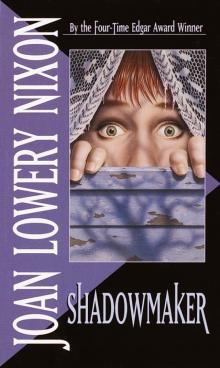 Shadowmaker
Shadowmaker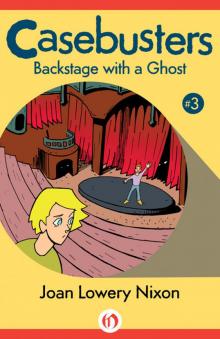 Backstage with a Ghost
Backstage with a Ghost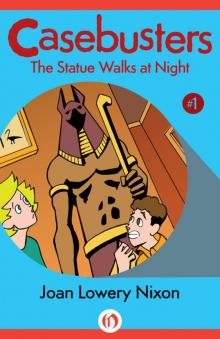 The Statue Walks at Night
The Statue Walks at Night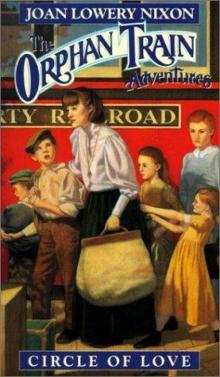 Circle of Love
Circle of Love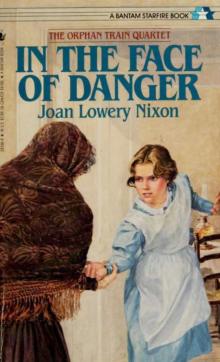 In the Face of Danger
In the Face of Danger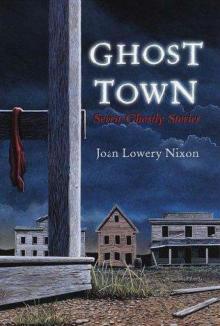 Ghost Town
Ghost Town A Candidate for Murder
A Candidate for Murder The Weekend Was Murder
The Weekend Was Murder The Island of Dangerous Dreams
The Island of Dangerous Dreams The Ghosts of Now
The Ghosts of Now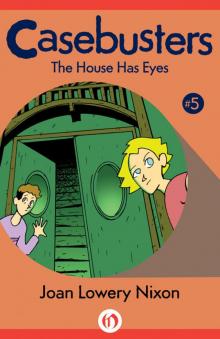 The House Has Eyes
The House Has Eyes The Dark and Deadly Pool
The Dark and Deadly Pool Keeping Secrets
Keeping Secrets Secret, Silent Screams
Secret, Silent Screams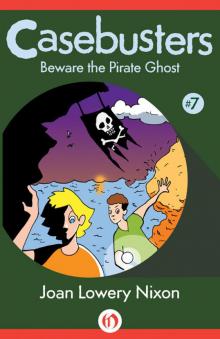 Beware the Pirate Ghost
Beware the Pirate Ghost Search for the Shadowman
Search for the Shadowman Haunted Island
Haunted Island